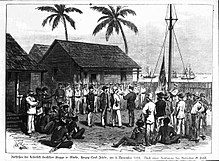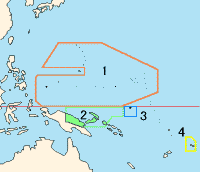This article lists the colonial governors of Papua New Guinea, from the establishment of German New Guinea in 1884 until the independence of the Territory of Papua and New Guinea in 1975.
List
(Dates in italics indicate de facto continuation of office)
New Guinea




| Tenure | Portrait | Incumbent | Notes |
|---|---|---|---|
| Commissioner of German New Guinea (1885–1887) | |||
| 1885 to January 1887 |
 |
Gustav von Oertzen | |
| Landeshauptleute of the German New Guinea Company (1886–1889) | |||
| 10 June 1886 to 1 March 1888 |
 |
Georg von Schleinitz | |
| 1 March 1888 to 31 October 1889 |
 |
Reinhold Kraetke | |
| Commissioner of German New Guinea (1889–1892) | |||
| 1 November 1889 to 31 August 1892 |
 |
Fritz Rose | Acting to 30 September 1890 |
| Landeshauptleute of the German New Guinea Company (1892–1899) | |||
| 1 September 1892 to 3 March 1895 |
 |
Georg Schmiele | |
| 3 March 1895 to 17 August 1896 |
 |
Hugo Rüdiger | |
| 22 September 1896 to 13 August 1897 |
 |
Curt von Hagen | Died in office |
| 15 August 1897 to 11 September 1897 |
 |
Albert Hahl | First time, acting |
| 11 September 1897 to 31 March 1899 |
 |
Hugo Skopnik | |
| In 1899, following the German–Spanish Treaty, the German Empire assumed direct control of the colony from the German New Guinea Company, appointing a governor. | |||
| Governors of German New Guinea (1899–1914) | |||
| 1 April 1899 to 10 July 1901 |
 |
Rudolf von Bennigsen | |
| 10 July 1901 to 13 April 1914 |
 |
Albert Hahl | Second time, acting to 10 November 1902 |
| 13 April 1914 to 17 October 1914 |
 |
Eduard Haber | Acting |
| In 1914, as part of the Asian and Pacific theatre of World War I, an expeditionary force from Australia called the Australian Naval and Military Expeditionary Force (AN&MEF) captured and occupied the territory following the Battle of Bita Paka and the Siege of Toma. In 1920, the territory was turned into a League of Nations mandate, administered by Australia, and formalized with the passage of the New Guinea Act 1920. | |||
| Military Administrators of the Territory of New Guinea (1914–1921) | |||
| 11 November 1914 to 8 January 1915 |
 |
Colonel William Holmes | Killed in the Battle of Messines (1917) |
| 8 January 1915 to 21 October 1917 |
 |
Colonel Samuel Pethebridge | |
| 21 October 1917 to 21 April 1918 |
 |
Seaforth Simpson Mackenzie | Acting |
| 21 April 1918 to 1 May 1920 |
 |
George Johnston | |
| 1 May 1920 to 21 March 1921 |
 |
Thomas Griffiths | First time |
| Administrators of the Territory of New Guinea (1921–1942) | |||
| 21 May 1921 to 13 June 1933 |
 |
Evan Wisdom | |
| 13 June 1933 to 12 September 1934 |
 |
Thomas Griffiths | Second time, acting |
| 12 September 1934 to December 1942 |
 |
Walter McNicoll | From 14 December 1937, Sir Walter Ramsay McNicoll; in Australia from 24 January 1942 |
| 24 January 1942 to 12 February 1942 |
 |
Kenneth Carlyle McMullen | Acting for McNicoll |
| Japanese Commanders of occupied New Guinea (1942–1945) | |||
| 21 January 1942 to 1942 |
 |
Tomitarō Horii | |
| 9 November 1942 to 13 September 1945 |
 |
Hatazō Adachi | Commander of the 18th Army |
| 9 November 1942 to 6 September 1945 |
 |
Hitoshi Imamura | Commander of the 8th Area Army, based at Rabaul, in charge of New Guinea islands |
| U.S. Military Commanders (1943–1944) | |||
| June 1943 to September 1944 |
 |
Walter Krueger | Commander of the 6th Army |
| September 1944 to December 1944 |
 |
Robert L. Eichelberger | Commander of the 8th Army |
| Heads of the New Guinea Administrative Unit (1942) | |||
| 14 February 1942 to 15 February 1942 |
 |
George Wilfred Lambert Townsend | Based in Port Moresby |
| 15 February 1942 to 10 April 1942 |
 |
Kenneth Carlyle McMullen | Based in Port Moresby |
In 1945, the Territory of New Guinea was merged with the Territory of Papua to form the Territory of Papua and New Guinea. The merger was formalized with the passage of the Papua and New Guinea Act 1949.
Papua


| Tenure | Portrait | Incumbent | Notes |
|---|---|---|---|
| Magistrate for Queensland in New Guinea (1883) | |||
| 3 April 1883 to 2 July 1883 |
 |
Henry Majoribanks Chester | Police Magistrate on Thursday Island |
| Special Commissioners for Great Britain in New Guinea (1884–1885) | |||
| 6 November 1884 to 2 December 1885 |
 |
Peter Scratchley | From 6 June 1885, Sir Peter Scratchley. Died in office |
| 2 December 1885 to 1886 |
 |
Hugh Hastings Romilly | Acting |
| 1886 to 1887 |
 |
John Douglas | |
| Administrator of British New Guinea (1888–1895) | |||
| 1888 to 1895 |
 |
Sir William MacGregor | |
| Lieutenant-Governors of British New Guinea (1895–1904) | |||
| 1895 to 1897 |
 |
Sir William MacGregor | |
| 1898 to 1903 |
 |
George Le Hunte | |
| 1903 to 1904 |
 |
Christopher Stansfield Robinson | Acting administrator |
| Lieutenant-Governors of Papua (1904–1942) | |||
| 1904 to 1907 |
 |
Francis Rickman Barton | Acting. The territory was renamed from British New Guinea to Papua with the passage of the Papua Act 1905 |
| 1908 to 27 February 1940 |
 |
Sir Hubert Murray | Died in office |
| 27 February 1940 to 1942 |
 |
Hubert Leonard Murray | Nephew of Sir Hubert Murray; acting |
| Military Administrator (1942–1946) | |||
| 13 February 1942 to 31 October 1945 |
 |
Major General Basil Morris | Commander of the 8th Military District |
| Head of the Papuan Civil Administrative Unit (1942) | |||
| 14 February 1942 to 10 April 1942 |
 |
Sydney Elliott-Smith | In Port Moresby |
| General Officers Commanding of the Australian New Guinea Administrative Unit [ANGAU] (1942–1946) | |||
| 10 April 1942 to August 1942 |
 |
Kenneth Carlyle McMullen | In Port Moresby |
| August 1942 to 24 June 1946 |
 |
Major General Basil Morris | In Port Moresby until October 1945, afterwards in Lae. Styled as Head of the ANGAU until 7 February 1944 |
| 4 September 1944 to 9 December 1944 |
 |
Brigadier Donald Cleland | Acting for Morris |
In 1945, the Territory of Papua was merged with the Territory of New Guinea to form the Territory of Papua and New Guinea. The merger was formalized with the passage of the Papua and New Guinea Act 1949.
Papua New Guinea

| Tenure | Portrait | Incumbent | Notes |
|---|---|---|---|
| Administrators of Papua and New Guinea (1945–1973) | |||
| 11 October 1945 to 5 June 1952 |
 |
Jack Keith Murray OBE | Provisional to 1 July 1949 |
| July 1952 to December 1966 |
 |
Brigadier Donald Cleland CBE | From 10 June 1961, Sir Donald Cleland |
| 9 January 1967 to 1970 |
 |
David Hay CBE, DSO | |
| 1970 to 1 December 1973 |
 |
Leslie Wilson Johnson CBE | In 1972, the name of the territory was changed to Papua New Guinea [1] |
| December 1973 |
 |
William Kearney CBE | Acting [2] |
| High Commissioners of Papua New Guinea (1973–1975) | |||
| December 1973 |
 |
William Kearney CBE | Acting [3] |
| 1 December 1973 to March 1974 |
 |
Leslie Wilson Johnson CBE | |
| March 1974 to 16 September 1975 |
 |
Thomas Kingston Critchley AO, CBE | Afterwards served as the Australian High Commissioner to Papua New Guinea until 1978 |
On 16 September 1975, Papua New Guinea achieved independence following the passage of the Papua New Guinea Independence Act 1975. For a list of viceroys in Papua New Guinea after independence, see Governor-General of Papua New Guinea.
See also
- History of Papua New Guinea
- Politics of Papua New Guinea
- Governor-General of Papua New Guinea
- Prime Minister of Papua New Guinea
References
- ^ "Papua New Guinea". State.gov. 10 August 2011. Retrieved 4 March 2012.
- ^ "Judges". archive.vn. 5 August 2012. Archived from the original on 5 August 2012. Retrieved 5 January 2021.
- ^ "University of Papua New Guinea Ordinance 1965 RE-APPOINTMENT OF MEMBERS OF THE COUNCIL OF THE UNIVERSITY OF PAPUA NEW GUINEA". Papua New Guinea Government Gazette (1971–1975). 20 December 1973. p. 1. Retrieved 5 January 2021.
External links
- Papua New Guinea history-related lists
- German people in German New Guinea
- Administrators of the Territory of New Guinea
- Governors of the Territory of Papua
- Administrators of Papua and New Guinea
- German New Guinea
- Territory of New Guinea people
- Territory of Papua people
- Territory of Papua and New Guinea people
- Papua New Guinea–United Kingdom relations
- Australia–Papua New Guinea relations
- Papua New Guinea politics-related lists
- Lists of colonial governors and administrators

